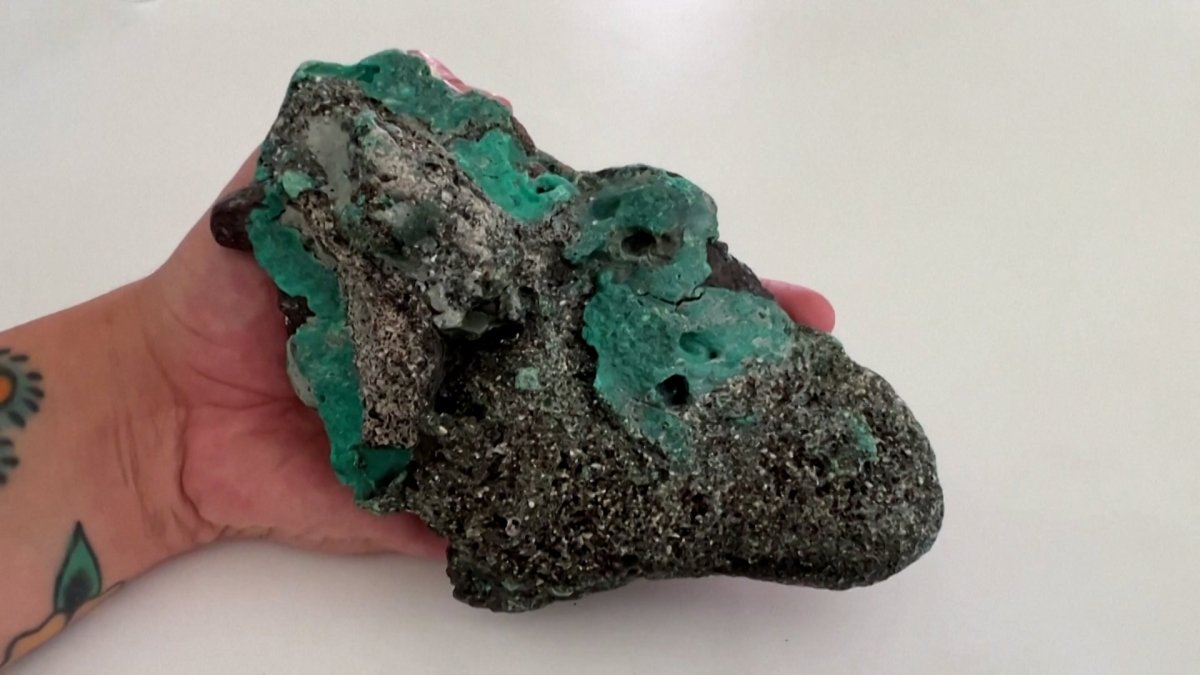At first, scientists couldn’t identify the strange bluish-green rocks so they ran chemical tests on them and… oh.

"Plastic rocks" found on Trindade Island in the state of Espirito Santo is seen at the laboratory of the Federal University of Parana, in Curitiba, state of Parana, Brazil March 7, 2023. Image credit: REUTERS/Rodolfo Buhrer
"Plastic rocks" have been found on a remote volcanic island off of the Brazilian coast in what geologists have described as a “new and terrifying” development. They added that the discovery is yet another sign of how human activity is drastically changing the natural world and even Earth’s geology.
Dubbed "plastiglomerates," the rocks are a mixture of sedimentary granules and other debris that have been fused together by plastic melted from volcanic activity.
As first reported by Reuters, geologists from the Federal University of Parana recently made the discovery on Trindade Island, a green turtle refuge with no permanent human settlement, found in the Atlantic 1,140 kilometers (708 miles) from Brazil’s southeastern state of Espirito Santo.
The scientists couldn’t initially identify the strange blue-ish green rocks, so they ran a number of chemical tests on the samples. This revealed that they are made of both rocky sediment and plastic most likely from fishing nets, a major contributor to plastic pollution in the world’s oceans.
"This is new and terrifying at the same time because pollution has reached geology," Fernanda Avelar Santos, a geologist at the Federal University of Parana, told the news agency.
"We identified (the pollution) mainly comes from fishing nets, which is very common debris on Trinidade Island's beaches. The (nets) are dragged by the marine currents and accumulate on the beach. When the temperature rises, this plastic melts and becomes embedded with the beach's natural material," Santos added.
This isn’t the first time plastiglomerates have been unearthed. Initially documented in 2014, it has now been seen in locations across the Earth’s surface.
However, this recent discovery on Trindade Island is particularly shocking as it’s relatively remote and home to a diverse selection of rare wildlife. The island serves as one of the main nesting sites of the green sea turtle in Brazil and has been known to harbor the nurseries of humpback whales.
No humans live on the islands, there is just a very small research station controlled by the Brazilian navy.
Plastiglomerates are a grim reflection of the wider problem of plastic pollution. According to a report released earlier this month, there are now more than 170 trillion pieces floating in the world’s oceans.
When discussing how human activity is impacting the planet, scientists sometimes use the term Anthropocene, a proposed geological epoch that’s defined by the impact of humans on Earth's geology and ecosystems. Not everyone agrees we have entered this epoch since geological timeframes usually work in gigantic time scales, not mere centuries.
However, as this new discovery shows, human-made materials are now having a very literal impact on Earth’s geology. Even long after humans are gone, traces of our activity will be left in the planet's geological record indefinitely.
"We talk so much about the Anthropocene, and this is it," said Santos.
- Mutton and aum
-

 2
2




Recommended Comments
There are no comments to display.
Join the conversation
You can post now and register later. If you have an account, sign in now to post with your account.
Note: Your post will require moderator approval before it will be visible.